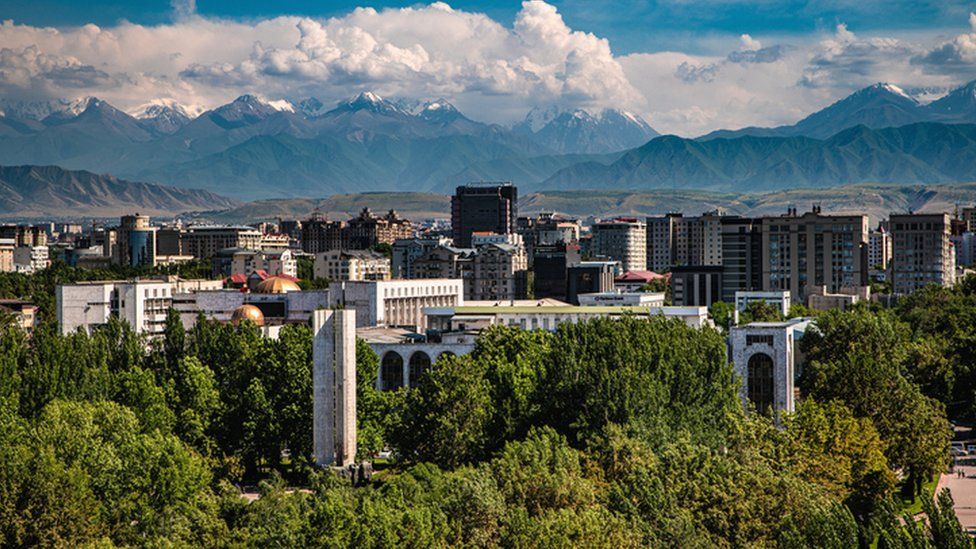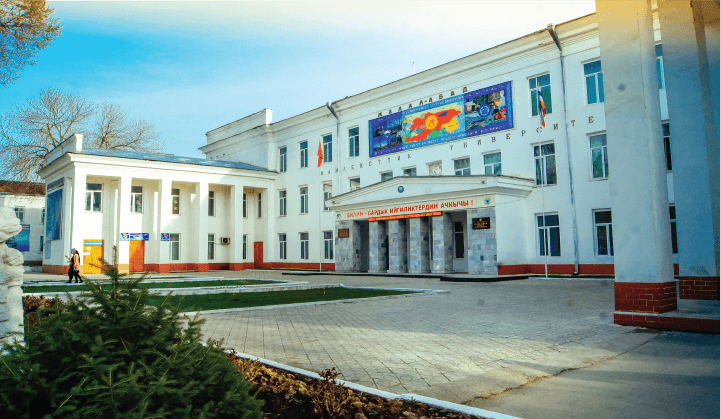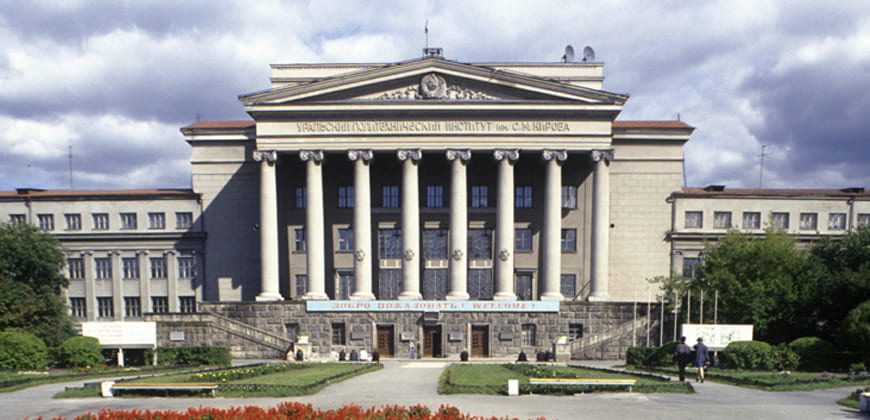MBBS In Kyrgyzstan
— Tenacity Education
About Kyrgyzstan
Kyrgyzstan, a captivating country in Central Asia, offers a unique blend of natural beauty, cultural diversity, and historical significance. With its majestic mountains, pristine alpine lakes, and sprawling steppe landscapes, it is a paradise for outdoor enthusiasts and adventure seekers. The Kyrgyz people, known for their warm hospitality, proudly embrace their nomadic heritage and traditional customs. The country’s cultural tapestry is woven with influences from Turkic, Russian, and Soviet legacies, creating a fascinating blend of traditions, music, dance, and cuisine.

Best University In Kyrgyzstan

Osh State University
Osh State University (OSU) was founded in 1951 and has since become one of the largest and most prestigious universities in Kyrgyzstan. It is a comprehensive university offering a wide range of programs in various disciplines, including medicine, humanities, natural sciences, engineering, economics, and more.

Jalal-Abad State University
Jalal-Abad State University is a well-established university that offers a diverse range of academic programs in fields such as medicine, engineering, agriculture, humanities, and social sciences. The university aims to provide high-quality education and foster intellectual growth and research opportunities for its students.

Kyrgyz Russian Slavic University
Kyrgyz Russian Slavic University was founded in 1993 and is known for its strong academic programs and international collaborations. It is a multidisciplinary university that offers a wide range of undergraduate and postgraduate programs in fields such as medicine, engineering, economics, humanities, social sciences, and more.

Kyrgyz State Medical Academy
The Kyrgyz State Medical Academy, known officially as the Kyrgyz State Medical Academy named after I.K. Akhunbaev is a medical school in Kyrgyzstan, located in Bishkek. Scientia, Experientia et Novitates – knowledge, experience and innovation!

Kyrgyzstan International Medical University
Kyrgyzstan International Medical University is a private medical university established in 2010. It aims to provide high-quality medical education and training to local and international students.
Fact About Kyrgyzstan
Here are some interesting facts about Kyrgyzstan:
Mountains and Nature: Kyrgyzstan is known for its breathtaking natural beauty, with over 90% of its territory covered by mountains. The country is home to the Tian Shan mountain range, which includes some of the highest peaks in Central Asia. It also boasts stunning alpine lakes, including Issyk-Kul, the second-largest mountain lake in the world.
Nomadic Heritage: The traditional nomadic lifestyle has deep roots in Kyrgyz culture. The country has a rich nomadic heritage, and even today, many Kyrgyz people practice a semi-nomadic lifestyle, herding livestock across the vast mountain pastures known as “jailoos.”
Manas Epic: The Kyrgyz people have a proud literary heritage centered around the Manas Epic, one of the world’s longest epics. The Manas Epic is a heroic poem passed down through generations, narrating the heroic deeds of the mythical hero Manas and his descendants.
Cultural Diversity: Kyrgyzstan is home to various ethnic groups, with the Kyrgyz being the largest ethnic group. There are also significant Uzbek, Russian, Tajik, and Kazakh populations, contributing to the country’s cultural diversity.
Hospitality: Kyrgyz people are known for their warm hospitality and welcoming nature. Guests are often treated with great respect and offered traditional foods and drinks as a sign of hospitality.
Why Study in Kyrgyzstan
Studying in Kyrgyzstan can offer several advantages and opportunities for international students. Here are some reasons why studying in Kyrgyzstan can be beneficial:
Affordable Education: Kyrgyzstan is known for its affordable tuition fees and low cost of living compared to many other countries. This makes it an attractive option for students who are seeking quality education without the burden of high expenses.
Recognized Universities and Quality Education: Kyrgyzstan is home to several recognized universities offering programs in various fields. Many of these universities are internationally recognized and accredited, ensuring that the education provided meets global standards. Medical universities in Kyrgyzstan, in particular, are well-regarded and attract a significant number of international students.
Multicultural Environment: Studying in Kyrgyzstan provides an opportunity to experience a multicultural environment. Students from different countries come to study in Kyrgyzstan, creating a diverse and inclusive atmosphere. This exposure to various cultures and perspectives can broaden your horizons and enhance your intercultural skills.
English-Medium Programs: Many universities in Kyrgyzstan offer programs taught in English, making it accessible for international students who may not be proficient in the local languages such as Kyrgyz or Russian. This facilitates learning and communication for international students.
Safe and Peaceful Environment: Kyrgyzstan is known for its safety and peaceful environment. The country has a low crime rate, providing a secure environment for students to focus on their studies and personal development.
Natural Beauty and Outdoor Activities: Kyrgyzstan’s stunning natural landscapes, including mountains, lakes, and valleys, offer opportunities for outdoor activities such as hiking, trekking, skiing, and mountaineering. Students can enjoy the beauty of nature and engage in adventurous pursuits during their free time.
Scholarship Opportunities: Some universities in Kyrgyzstan offer scholarships and financial aid programs for international students. These scholarships can help reduce the financial burden and make education more accessible.
When considering studying in Kyrgyzstan, it’s important to research and choose a reputable university, understand the admission requirements, and consider factors such as program quality, future career prospects, and recognition of degrees in your home country or desired destination.
Education System in Kyrgyzstan
The education system in Kyrgyzstan follows a structure similar to many other countries. Here’s an overview of the education system in Kyrgyzstan:
Primary and Secondary Education: The education system begins with primary education, which is compulsory and lasts for nine years, starting from age six. After completing primary education, students progress to secondary education, which is divided into two stages: lower secondary (grades 10-11) and upper secondary (grades 12-11). Secondary education is not compulsory but is widely attended by students.
Higher Education: Higher education in Kyrgyzstan is offered by universities, academies, and institutes. Universities offer bachelor’s, master’s, and doctoral programs across a range of disciplines. Higher education institutions may be either state-funded or private. Public universities are typically more affordable, while private institutions tend to have higher tuition fees.
Bachelor’s Degree: The standard duration of a bachelor’s degree program in Kyrgyzstan is typically four years, although some programs, such as medicine, may take longer. The bachelor’s degree is awarded upon successful completion of the required coursework and passing the final examinations.
Master’s Degree: A master’s degree program in Kyrgyzstan usually takes two years to complete. It involves advanced coursework, research, and the submission of a master’s thesis. Students can pursue a master’s degree after completing their bachelor’s degree.
Doctoral Degree: Doctoral programs in Kyrgyzstan are research-intensive and typically take three to four years to complete. Students undertake original research in their field of study and write a doctoral dissertation. Successful completion of the program leads to the award of a Ph.D. or equivalent doctoral degree.
Grading System: The grading system in Kyrgyzstan typically uses a 5-point scale, with 5 being the highest grade and 2 or lower indicating a fail. Some institutions may use a 10-point grading scale, similar to the European Credit Transfer and Accumulation System (ECTS).
It’s important to note that the language of instruction in Kyrgyzstan’s education system is primarily Kyrgyz and Russian. However, some universities offer programs taught in English to accommodate international students.
The Ministry of Education and Science of the Kyrgyz Republic is responsible for overseeing and regulating the education system in Kyrgyzstan, ensuring quality standards and providing guidelines for educational institutions.
Student Life in Kyrgyzstan
Student life in Kyrgyzstan offers a vibrant and enriching experience for both local and international students. Here are some aspects of student life in Kyrgyzstan:
Campus Facilities: Universities in Kyrgyzstan provide modern and well-equipped campus facilities. This includes libraries, computer labs, sports complexes, cafeterias, and student centers. These facilities create a conducive environment for studying, socializing, and engaging in extracurricular activities.
Cultural and Social Events: Universities in Kyrgyzstan organize various cultural and social events throughout the year. These events include festivals, concerts, sports competitions, talent shows, and academic conferences. Participating in these events allows students to showcase their talents, celebrate diversity, and forge new friendships.
Student Organizations and Clubs: There are numerous student organizations and clubs in Kyrgyzstan’s universities catering to various interests and fields of study. These organizations provide opportunities for students to engage in activities related to their passions, such as sports, arts, music, debate, volunteering, and more. Joining these clubs allows students to develop their skills, pursue their interests, and network with like-minded peers.
Sports and Recreation: Universities in Kyrgyzstan encourage physical fitness and offer sports facilities and teams for students to participate in various sports and recreational activities. Students can engage in sports like football, basketball, volleyball, tennis, swimming, and more. These activities promote a healthy lifestyle and foster teamwork and camaraderie among students.
Student Support Services: Universities in Kyrgyzstan typically have dedicated support services for students, including counseling centers, academic advising, career services, and health facilities. These services are designed to provide assistance and support to students in their academic and personal development.
Student Housing: Many universities in Kyrgyzstan offer on-campus accommodation for students, including dormitories or hostels. Living in student housing provides a sense of community and facilitates interaction with fellow students from different backgrounds.
Cultural Exploration and Travel Opportunities: Kyrgyzstan’s unique location and natural beauty offer ample opportunities for students to explore the country’s cultural heritage and engage in outdoor activities. Students can visit historical sites, experience traditional festivals, explore nature reserves, go hiking or skiing in the mountains, and venture on cultural excursions to learn about Kyrgyz traditions.
Overall, student life in Kyrgyzstan is dynamic and engaging, providing opportunities for personal growth, cultural immersion, and the development of lifelong friendships. It offers a balance between academic pursuits, extracurricular activities, and the exploration of the country’s rich cultural and natural heritage.
Disadvantages of MBBS in Kyrgyzstan
While studying MBBS in Kyrgyzstan has its advantages, it’s important to consider potential disadvantages as well. Here are some common challenges or disadvantages that students may encounter:
Language Barrier: The primary language of instruction in many medical universities in Kyrgyzstan is either Kyrgyz or Russian. For international students who are not proficient in these languages, the language barrier can pose difficulties in understanding lectures, communicating with professors and patients, and overall academic performance. However, some universities do offer English-medium programs to cater to international students.
Quality Assurance: While there are reputable medical universities in Kyrgyzstan, it’s essential to research and choose a recognized institution. Not all universities may maintain consistent quality standards or have the necessary infrastructure and resources to deliver a high-quality medical education. It is crucial to thoroughly evaluate the university’s accreditation, faculty qualifications, clinical training facilities, and overall reputation.
Recognition of Degree: Before deciding to study MBBS in Kyrgyzstan, it is important to consider the recognition and acceptance of the degree in your home country or the country where you plan to practice medicine. Some countries may have specific requirements or examinations for graduates of foreign medical programs to practice medicine locally. It is advisable to check with the relevant medical authorities in your country beforehand.
Cultural Adaptation: Moving to a foreign country for studies can be a significant cultural adjustment. Students may need time to adapt to the new environment, different customs, and lifestyle. It’s important to be prepared for cultural differences, language barriers, and a different educational system.
Limited Clinical Exposure: Depending on the university and its resources, students studying MBBS in Kyrgyzstan may have limited clinical exposure during their early years of study. Clinical training opportunities and access to modern medical facilities may vary among universities. It’s important to inquire about the clinical training curriculum and facilities before choosing a university.
Distance from Home: Kyrgyzstan may be geographically distant from the home country of international students. This distance can lead to feelings of homesickness and difficulties in adjusting to a new environment, especially for those who are accustomed to being close to family and friends.
Before making a decision to pursue MBBS in Kyrgyzstan, it is important to thoroughly research and consider these potential disadvantages alongside the advantages. It’s advisable to consult with educational consultants, current students, and relevant authorities to gather all necessary information and make an informed decision.
